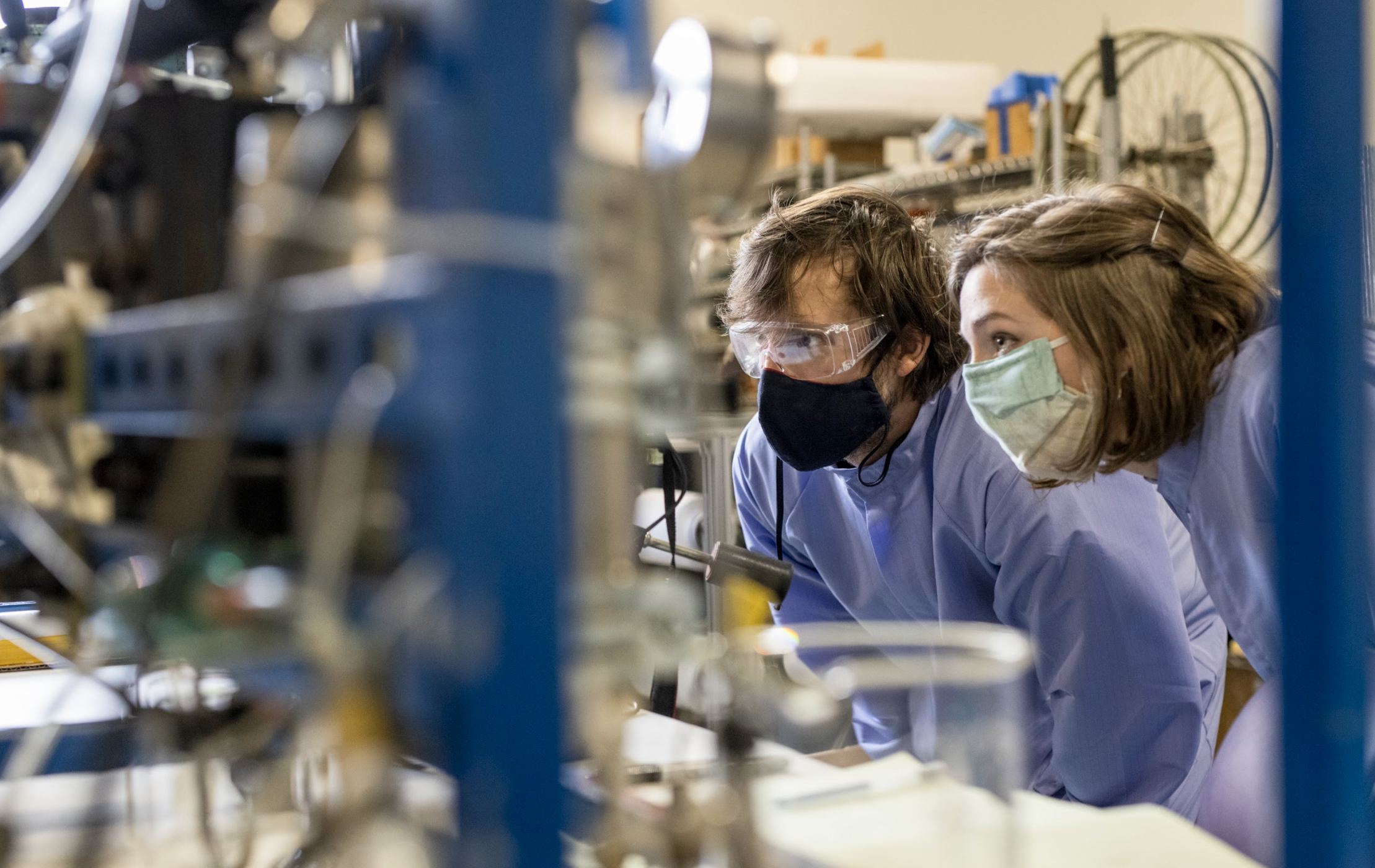AeroShield Offers a Clear View to Better Buildings
October 11, 2021
The United States can’t slow climate change without changing how we heat, cool, and power our buildings. Thankfully, a growing cadre of Activate Fellows is on the job. Join them by applying to Cohort 2022 with your vision for better buildings.
The $20 billion in heating bills that research from Lawrence Berkeley National Laboratory attributes to traditional window materials is not just an economic loss; it’s waste that drives climate change. While energy-efficient windows exist, their cost is a deterrent to widespread use. Enter AeroShield—a startup co-founded by Activate Fellows Elise Strobach and Kyle Wilke that has developed a groundbreaking technology to make windows both energy-efficient and affordable, thanks to a highly transparent, insulating material.

Activate Fellows and AeroShield co-founders Kyle Wilke (left) and Elise Strobach (right) in the lab
Currently, the market is dominated by double-pane windows insulated with argon gas. However, that method provides limited insulation, leaving consumers with alternatives that are either too costly or have poor transparency. These alternatives include triple-pane windows which operate similarly to double panes but provide greater insulation at a much higher cost and greater weight. Some window manufacturers offer insulation made from silica aerogels, but those lack the transparency that AeroShield’s inserts provide.
AeroShield’s inserts are silica aerogels, which are both exceptionally lightweight (made mostly of air) and insulating because heat cannot easily escape through its nanoscale pores, providing an optimal combination of performance and savings for consumers. The inserts are so effective that they can increase insulation from double-pane windows by 50 percent. The extra insulation they provide reduces the flow of heat from windows resulting in massive energy savings for consumers since the outside air has less of an impact on indoor temperatures.
AeroShield has raised grants from the Department of Energy, the National Science Foundation, the Massachusetts Clean Energy Center, as well as private investments. The team, which now includes Aaron Baskerville-Bridges, who joined this spring as co-founder and vice president of operations, will have an industry prototype in December, at which time it plans to start working with customers.
Strobach and Wilke are part of Activate’s Boston Community, Cohort 2020. When not in the lab, they and access office space and business resources at the Cambridge Innovation Center, an Activate partner.
BTO’s Foundational Support
The Department of Energy’s Building Technology Office (BTO) has also played an important role in Strobach and Wilke’s success. “We’ve received advice and industry expertise from BTO, and participated in many of their conferences and programs,” says Strobach. That includes Incubating Market-Propelled Entrepreneurial-mindset at the Labs and Beyond (IMPEL), a BTO tech-to-market program focused on building technologies and hosted at Lawrence Berkeley National Laboratory.
Strobach and Wilke have used BTO resources to better understand the window manufacturing supply chain and to develop their go-to-market strategies and to tailor their business plan to window manufacturers, who serve as their primary customers, as well as investors.
BTO has also supported other Activate Fellows, based in the Activate Berkeley Community and hosted at Berkeley Lab’s Cyclotron Road Division, through direct fellowship funding. These fellows include Sam Calisch, Cohort 2020, as well as Matt Ryan and Ryan Pearson from Cohort 2018.
Elmworks, Calisch’s startup, is developing an additive manufacturing platform that can replace coil windings in critical clean energy technologies like electric motors, wireless chargers, and power converters. These components enable the transition away from fossil-fuel-based HVAC systems and appliances, which some municipalities have banned in new building construction. They are also essential for integrating renewable energy sources and storage systems into buildings.

Ryan and Pearson’s startup, Cypris Materials, has developed paintable self-assembling structural color coatings that can be used in a wide range of applications, including as a replacement to toxic colorants, and even as coatings that can be tuned to reflect UV and NIR rays to keep buildings cooler.
Support from BTO and Activate’s other partners conveys a seal of approval to private investors, who may be reluctant to be the first funder for early-stage deep-tech startups. Other buildings-focused companies by Activate Fellows include Gradient (Vince Romanin, Cohort 2017), which makes an innovative residential heating and cooling unit based on heat pump technology, and Nelumbo (Lance Brockway, David Walther, Cohort 2017), which uses cutting-edge material science to control frost and corrosion in building HVAC and refrigeration systems.
Two Years of Support for Science Innovators
Our fellows receive funding, technical support, and networking opportunities to transform their research into marketable products designed to address climate change or other global challenges. Activate also helps fellows define and develop themselves as leaders, something Strobach wrote about in this letter to her younger self.
If you are a scientist or engineer looking to take your research to market, apply for our fellowship, or nominate someone looking to take this path.
Activate Fellows receive:
A yearly living stipend of $80,000 to $110,000 plus a health insurance stipend and travel allowance. Each project also receives $100,000 of research support.
Access to world-class research facilities in Berkeley, CA, Boston, MA, and New York, NY, or the ability to join the Activate Anywhere Community and work from qualified research facilities anywhere across the U.S.
A program of intensive entrepreneurial training, mentorship, and networking.
In addition to fellows focused on new technologies for smarter, more energy-efficient buildings, Activate supports fellows developing new products for the agriculture, chemicals, computing, defense, electricity, manufacturing, and transportation sectors. Starting with Cohort 2022, we’ll also support fellows who are developing carbon dioxide removal technologies.
Since 2015, 103 Activate Fellows have launched 74 new companies. These companies have raised more than $370M in follow-on funding and created more than 300 U.S.-based high-tech jobs. As a non-profit, Activate does not take an equity stake in fellows’ startups. Visit the Activate website to learn more. Applications for Cohort 2022 open October 15 and close November 30 at 5:00 pm PT.
